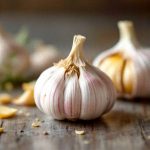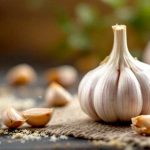Takeaways
- Garlic contains compounds that may aid digestion
- Regular consumption could help reduce indigestion symptoms
- Allicin in garlic has potential antimicrobial properties
- Garlic may support a healthy gut microbiome
- Preparation methods affect garlic’s digestive benefits
- Moderation is important when using garlic for digestion
What is Garlic?
Garlic, a common ingredient in global cuisine, is a pungent bulb from the Allium family, which also includes onions and leeks.[1] For thousands of years, people have used garlic both for cooking and as a traditional medicine.
The scientific name for garlic is Allium sativum.[2] It grows as an underground bulb, with long green leaves extending above ground. Each bulb contains multiple cloves, each individually wrapped in a thin, papery skin.[3]
Garlic is valued by cooks for its strong, savory flavor, which enhances many dishes from different culinary traditions. Beyond cooking, garlic has been used in traditional medicine for a long time.
Common types of garlic include:
- Softneck garlic
- Hardneck garlic
- Elephant garlic
- Black garlic
The History of Garlic
Ancient Uses
Garlic has a long history of human use, with ancient civilizations valuing it for both food and medicine. For instance, Egyptians provided garlic to workers building the pyramids, believing it increased their strength and endurance.[4]
In ancient Greece and Rome, athletes consumed garlic before competitions, and soldiers ate it to improve courage before battle.[5] Traditional healers used garlic to treat various health issues, ranging from coughs to parasitic infections.
Modern Rediscovery
Current scientific research is exploring the potential health benefits of garlic, particularly its effects on heart health, immunity, and digestion.[6] This increased interest is contributing to garlic’s popularity in the health and wellness community.
Many individuals now take garlic supplements, hoping to benefit from its potential health properties.[7] Fresh garlic is still a key component of many healthy diets around the world, and its possible impact on digestion is of particular interest.
Garlic’s Nutritional Profile
Garlic is nutritionally dense, containing a variety of vitamins, minerals, and beneficial compounds.[8] These nutrients are thought to contribute to its potential health advantages.
Here is a breakdown of the nutrients found in 100 grams of garlic:
| Nutrient | Amount |
|---|---|
| Calories | 149 |
| Protein | 6.36 g |
| Carbohydrates | 33.06 g |
| Fiber | 2.1 g |
| Vitamin C | 31.2 mg |
| Vitamin B6 | 1.235 mg |
| Manganese | 1.672 mg |
| Selenium | 14.2 µg |
Cooking can alter garlic’s nutritional value. Heat may break down some compounds, such as allicin.[9] However, it can also enhance the availability of other nutrients. Chopping or crushing garlic before cooking may help retain its beneficial compounds.[10]
Garlic contains active compounds beyond basic nutrients, including allicin, alliin, and ajoene.[11] These sulfur compounds contribute to garlic’s distinct smell and taste, and may also play a role in its potential health effects.
Understanding Indigestion
Indigestion, also known as dyspepsia, refers to discomfort in the upper abdomen that often occurs during or after eating.[12] Common symptoms include bloating, nausea, and a feeling of fullness.
Digestion is the process of breaking down food into nutrients that the body can absorb.[13] It begins in the mouth and continues through the stomach and intestines, involving various organs and enzymes.
Many factors can disrupt digestion and cause indigestion, including stress, certain foods, and poor eating habits. In some cases, medical conditions may also lead to persistent indigestion.
Common triggers for indigestion include:
- Overeating
- Eating too quickly
- Fatty or spicy foods
- Caffeine and alcohol
- Stress and anxiety
How Garlic Aids Digestion
Stimulating Digestive Juices
Garlic may stimulate the production of digestive juices, such as stomach acid and bile.[14] These fluids are essential for breaking down food and absorbing nutrients.
Increased digestive juices may improve the breakdown of proteins and fats, potentially leading to more efficient digestion and less discomfort after meals. Improved digestion can also enhance nutrient absorption.
Promoting Gut Health
Garlic may act as a prebiotic, which supports the growth of beneficial bacteria in the gut.[15] Prebiotics are fibers that nourish these good bacteria, and a healthy gut bacteria balance is important for both digestion and overall well-being.
Garlic’s possible effects on different types of gut bacteria are varied:
| Bacteria Type | Potential Effect of Garlic |
|---|---|
| Bifidobacteria | May increase growth |
| Lactobacilli | Possible positive impact |
| E. coli | May inhibit growth |
| Salmonella | Potential antimicrobial effect |
By promoting the growth of beneficial bacteria, garlic may help maintain a healthy digestive system, which could result in improved digestion and fewer symptoms of indigestion.
Active Compounds in Garlic
Allicin: The Star Player
Allicin is the primary active compound in garlic, forming when raw garlic is chopped or crushed.[16] This process enables an enzyme called alliinase to convert alliin into allicin.
Allicin is responsible for garlic’s strong odor and many of its potential health benefits.[17] It has antimicrobial properties that may help fight harmful bacteria in the gut, which could contribute to improved digestive health.
Allicin may also have anti-inflammatory effects.[18] Inflammation in the digestive tract can cause discomfort and indigestion. By reducing inflammation, allicin may help relieve these symptoms.
Other Beneficial Compounds
Besides allicin, garlic contains other sulfur compounds, including diallyl disulfide and s-allyl cysteine.[19] These compounds may also contribute to garlic’s potential health benefits.
Other bioactive compounds found in garlic include:
- Flavonoids
- Saponins
- Nitrogen oxides
- Proteins
These compounds act together to produce garlic’s potential benefits. Some have antioxidant properties that may protect the digestive system from damage. Others may support overall gut health in different ways.
Garlic’s Effects on Common Digestive Issues
Bloating and Gas
Garlic might help reduce bloating and gas, which are common symptoms of indigestion. Its prebiotic effects may support a healthy balance of gut bacteria, which is essential for digestion and gas reduction.
The sulfur compounds in garlic might also improve the efficiency of food breakdown, potentially leading to less gas production during digestion.[20] However, some people might experience increased gas when they first start eating more garlic.
Stomach Discomfort
Garlic has a long history of being used to treat stomach problems. Its anti-inflammatory properties may help soothe stomach discomfort, and it might also support the stomach’s protective mucus layer.
Traditional healers have used garlic to address various digestive issues, such as stomach pain, nausea, and indigestion. While more research is needed, many people have found garlic helpful for relieving stomach discomfort.
Preparing Garlic for Digestive Health
Raw vs. Cooked
Raw and cooked garlic might offer different benefits for digestion. Raw garlic has the highest levels of allicin, which breaks down quickly when heated.[21] Eating raw garlic may provide the most potent digestive benefits.
Cooking garlic reduces its allicin content; however, it can also make garlic easier to eat in larger quantities.[22] Cooked garlic still contains beneficial compounds, some of which become more easily absorbed when heated.
Supplements and Extracts
Garlic supplements and extracts offer a convenient alternative to fresh garlic. These products are designed to provide garlic’s potential health benefits in an easier to consume format. They can be useful for people who don’t enjoy garlic’s taste or smell.
Garlic supplements have potential advantages and disadvantages for digestion.[23] They often contain standardized amounts of beneficial compounds, which makes consistent dosing easier. However, they may not provide all of the complex interactions found in whole garlic.
Common types of garlic supplements include:
- Garlic powder capsules
- Aged garlic extract
- Garlic oil softgels
- Allicin tablets
Incorporating Garlic into Your Diet
Incorporating more garlic into meals can be easy and enjoyable. Start by using fresh garlic in cooking. To help beneficial compounds form, crush or chop the garlic and let it sit for a few minutes before cooking.
Garlic’s versatility is evident in many different cuisines. Add it to stir-fries, soups, and sauces. Roasted whole garlic cloves offer a milder, sweeter flavor. For maximum potential benefits, try using raw garlic in dressings or dips.
Steps to maximize the potential digestive benefits of garlic when cooking:
- Choose fresh, firm garlic bulbs
- Peel and chop or crush garlic
- Let chopped garlic rest for 10-15 minutes
- Add garlic towards the end of cooking
- Consume with a variety of other foods
Potential Side Effects and Precautions
While garlic is generally considered safe, some people may experience side effects such as bad breath and body odor. Garlic can also cause heartburn or an upset stomach in some individuals.
Individuals taking blood thinners should use caution with garlic because it may increase the risk of bleeding.[24] It is also advisable to avoid garlic supplements before surgery. Always consult with a healthcare provider before starting any new supplements.
Potential interactions between garlic and medications include:
- Blood thinners (e.g., warfarin)
- HIV medications
- Birth control pills
- Some diabetes medications
Garlic in Research: What Science Says
Scientific research into garlic’s effects on digestive health is ongoing. Some studies suggest that garlic may help with various digestive problems.[25] However, more research is necessary to fully understand its effects.
Current research has limitations. Many studies use garlic extracts rather than whole garlic, making it difficult to apply the findings to dietary garlic. Sample sizes are often small, and long-term effects require more study.
| Study Focus | Findings | Limitations |
|---|---|---|
| Gut bacteria | Potential prebiotic effects | Limited human trials |
| Bloating | Possible reduction in some cases | Mixed results |
| Stomach ulcers | Protective effects in animal studies | More human research needed |
| Indigestion | Some symptom relief reported | Larger studies required |
Beyond Digestion: Other Potential Benefits of Garlic
Garlic’s potential benefits extend beyond digestion. Some studies suggest it may support heart health by helping lower blood pressure and cholesterol levels, which may reduce the risk of heart disease.
Garlic may also support the immune system.[26] Some studies indicate it may help fight the common cold and its antimicrobial properties might help fight various pathogens; however, more studies are needed to confirm these effects.
Ongoing research is exploring the potential of garlic in other areas such as cancer prevention and cognitive health. Although early results are promising, further studies are needed.
FAQs: People Also Ask
How much garlic should I eat for indigestion?
Can garlic worsen acid reflux?
Is garlic good for gut bacteria?
How long does it take for garlic to help with digestion?
Are there any foods I should avoid when using garlic for indigestion?
Can I take garlic supplements instead of eating raw garlic?
Conclusion
Garlic shows promise as a natural aid for indigestion and promoting digestive health. Its active compounds may help stimulate digestion and support a healthy gut. From reducing bloating to easing stomach discomfort, garlic may provide several benefits.
Adding garlic to your diet is both easy and flavorful. Whether raw or cooked, garlic enhances the taste of meals and offers potential health advantages. Supplements provide an alternative option for those who prefer them, but consulting a healthcare provider is advisable before making major dietary changes.
Remember that garlic is not a complete cure for digestive problems. It works best as part of a balanced diet and healthy lifestyle. Pay attention to how your body reacts when adding more garlic to your routine. With patience and consistency, garlic might be a beneficial addition to your approach to digestive health.
Garlic (Allium sativum) is a member of the Allium genus, which also includes other well-known vegetables like onions, leeks, shallots, and chives.
The scientific or botanical name of an organism is the standard way scientists refer to it to avoid confusion. Allium sativum is the universally accepted scientific name for garlic.
The structure of a garlic bulb is characterized by individual segments known as cloves, each covered in its own protective, thin skin. These cloves make up the bulb.
While definitive proof is hard to come by, records and accounts from ancient Egypt do suggest the use of garlic to provide strength and endurance for laborers, including those working on large building projects like pyramids.
Historical texts suggest both Greek and Roman athletes consumed garlic to boost performance, and soldiers to enhance bravery. This usage highlights the ancient perception of garlic as beneficial.
Many studies are exploring garlic’s impact on different areas of health, such as cardiovascular benefits, immune modulation, and potential digestive benefits.
Due to their ease of use, garlic supplements are a popular choice for people seeking the potential health benefits of garlic. These supplements come in various forms, like capsules, tablets, and extracts.
Garlic is known to contain numerous beneficial nutrients such as vitamins (including some B vitamins and vitamin C), minerals (like manganese, selenium and phosphorus), and sulfur-containing compounds that are responsible for its properties.
Allicin, the key bioactive compound in garlic, is sensitive to heat and degrades when heated, which is why raw garlic has the highest levels of it.
Chopping or crushing raw garlic activates the enzyme alliinase, which converts alliin to allicin. Letting the crushed garlic stand for some time before cooking ensures a greater amount of allicin is produced and available before it is degraded by heat.
These sulfur compounds are primarily responsible for garlic’s distinct smell and flavor and also play a role in its potential health properties.
Indigestion is a general term that refers to discomfort in the upper abdomen and may include symptoms like bloating, nausea, and feeling full.
The digestive system’s primary function is to break down ingested food into smaller molecules that can be absorbed into the body and used for energy, growth, and repair.
There is some limited research suggesting that garlic may increase the secretion of digestive juices, including stomach acid and bile. Further studies are needed to confirm these effects and their impact on digestion.
Garlic contains compounds such as fructans that are classified as prebiotics and promote the growth of beneficial bacteria in the gut. These substances are not digested by the human digestive system but provide food for the healthy bacteria in the intestines.
Allicin is formed when the enzyme alliinase interacts with alliin after cells are damaged from chopping or crushing. This is why raw garlic is typically richer in allicin.
The sulfur compounds in allicin are what produce the strong odor associated with garlic. Allicin is also believed to be a main contributor to garlic’s potential health benefits, such as antioxidant, antimicrobial and anti-inflammatory properties.
There is some evidence indicating that allicin has anti-inflammatory properties; however, more research, especially human clinical trials, are required to establish the extent and mechanisms of these effects.
Diallyl disulfide and s-allyl cysteine are examples of other sulfur-containing compounds in garlic. These compounds are believed to have their own set of potential health benefits.
Some studies suggest that garlic’s sulfur compounds could improve food breakdown and reduce gas. However, individual responses to garlic can vary, and some people might experience increased gas. More research is needed to fully understand garlic’s impact on gas production.
Allicin is formed from alliin when raw garlic is chopped or crushed. However, this compound is unstable and quickly degrades when exposed to heat, making raw garlic the best source of allicin.
Cooking significantly reduces the amount of allicin in garlic. It does make garlic milder and easier to consume in larger portions for people that may not like the taste of raw garlic.
Garlic supplements offer convenience and standardized dosing; however, they may not offer all the complex benefits associated with consuming whole garlic.
Garlic has antiplatelet properties, which may increase the risk of bleeding in people using anticoagulants. Therefore, those on blood thinning medications should consult their healthcare provider before increasing garlic consumption or taking garlic supplements.
Some research studies point towards potential benefits of garlic to help with different digestive issues. However, more research is needed to fully understand the scope and efficacy of these claims.
There are several studies suggesting that garlic may help support the immune system. More research is still needed to fully support this.
Source: “Garlic bioactive substances and their therapeutic applications for improving human health: a comprehensive review” https://www.ncbi.nlm.nih.gov/pmc/articles/PMC11194342/



